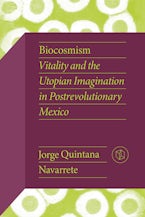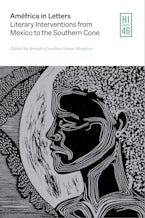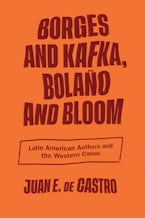- Home
- When a Robot Decides to Die and Other Stories

When a Robot Decides to Die and Other Stories
Translated by Bradley J. Nelson
A manufactured and pre-programmed serial killer; a suicidal robot; a romantic necrophiliac; and an archaeologist who feeds the perverse desires of aficionados of the apocalypse—Francisco García Gonzalez's stories map out literary and metafictional approaches to the sci-fi universe in ways that echo the humor and violence of Miguel de Cervantes, María de Zayas, Jorge Luis Borges, Rosa Montero, and Roberto Bolaño.
With a scholarly introduction by translator Bradley J. Nelson that introduces García González's oeuvre to contemporary readers and scholars of Spanish-language literature, this science fiction collection introduces Anglophones to this unique author.
García González turns a black mirror on contemporary society and its relation both to history and to the future. His insightfulness and relevance draw comparisons with Margaret Atwood, Neal Stephenson, and China Miéville, though his verbal economy and elegance are more akin to Cormac McCarthy, producing both disturbingly uncanny violence and unexpected comedy.
With a scholarly introduction by translator Bradley J. Nelson that introduces García González's oeuvre to contemporary readers and scholars of Spanish-language literature, this science fiction collection introduces Anglophones to this unique author.
García González turns a black mirror on contemporary society and its relation both to history and to the future. His insightfulness and relevance draw comparisons with Margaret Atwood, Neal Stephenson, and China Miéville, though his verbal economy and elegance are more akin to Cormac McCarthy, producing both disturbingly uncanny violence and unexpected comedy.
Introduction
"Dystopia Is Now: The Reality of Science Fiction in Francisco García González" by Bradley J. Nelson
Part 1: Of Robots and Other Perversions
When a Robot Decides to Die
True Killer
Fucking Swedes
The Visit
Part 2: Uchronias
The Year of the Pig
Waiting for the Wagon
Why Do Dogs Bark at the Moon?
Yusnavy, the Eclipse of a Star
How Nicely She Walks
"Dystopia Is Now: The Reality of Science Fiction in Francisco García González" by Bradley J. Nelson
Part 1: Of Robots and Other Perversions
When a Robot Decides to Die
True Killer
Fucking Swedes
The Visit
Part 2: Uchronias
The Year of the Pig
Waiting for the Wagon
Why Do Dogs Bark at the Moon?
Yusnavy, the Eclipse of a Star
How Nicely She Walks
Francisco García González is a writer, editor, and screenwriter. He was born in Havana in 1963. He won Cuba’s Hemingway Short Story Prize in 1999.
Bradley J. Nelson is a professor of Spanish at Concordia University.
"In a world of writers and readers addicted to fireworks, Francisco García González shows, once again, that it is possible to illuminate skies without explosions."
—Hispanophone
"Francisco García González is the tenant of his words but the owner of his silences. That seems easy, but it is very hard."
—Lattin Magazine
A robot assembled in a way he hadn’t seen in years exited through one of the doors with his head hanging down. As he walked by he dejectedly shrugged his shoulders and then made his way out of the office. Reynel recognized the semblance and attitude of cleaning staff.
This robot was followed by another. He recognized the author of the Leroy Evanson philosophical novels. If there was one genre he hated it was that one: philosophical novels. For him Evanson’s rubbish was neither one thing nor the other. They were the kind of product destined for arrogant robots who thought highly of their own intelligence. It wasn’t due to the pleasure his books provided, according to the reviews, that he’d become the most-read author on the transports. Readers’ affectations were, Reynel believed, the key to the author’s success, his adoring public, and his triumphant bearing. All that was forbidden to Reynel, although things could change.
“This very afternoon,” he thought.
. . . and he thought about hardcover editions, bound books in bookstores and libraries . . . on supermarket shelves.
“Reynel T?” another secretary asked him. “Please, come, the editor is waiting for you.”
This robot was followed by another. He recognized the author of the Leroy Evanson philosophical novels. If there was one genre he hated it was that one: philosophical novels. For him Evanson’s rubbish was neither one thing nor the other. They were the kind of product destined for arrogant robots who thought highly of their own intelligence. It wasn’t due to the pleasure his books provided, according to the reviews, that he’d become the most-read author on the transports. Readers’ affectations were, Reynel believed, the key to the author’s success, his adoring public, and his triumphant bearing. All that was forbidden to Reynel, although things could change.
“This very afternoon,” he thought.
. . . and he thought about hardcover editions, bound books in bookstores and libraries . . . on supermarket shelves.
“Reynel T?” another secretary asked him. “Please, come, the editor is waiting for you.”











